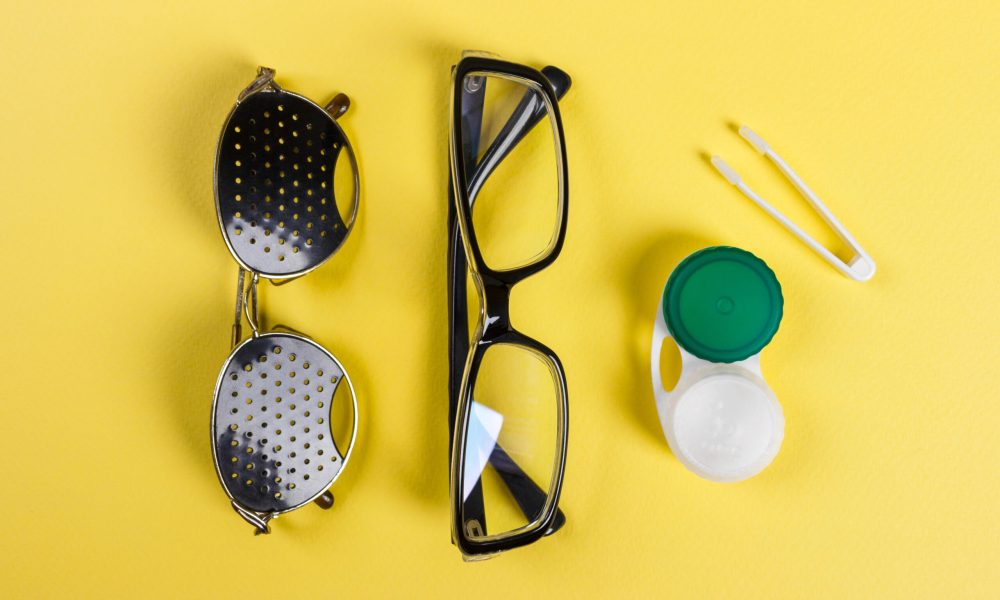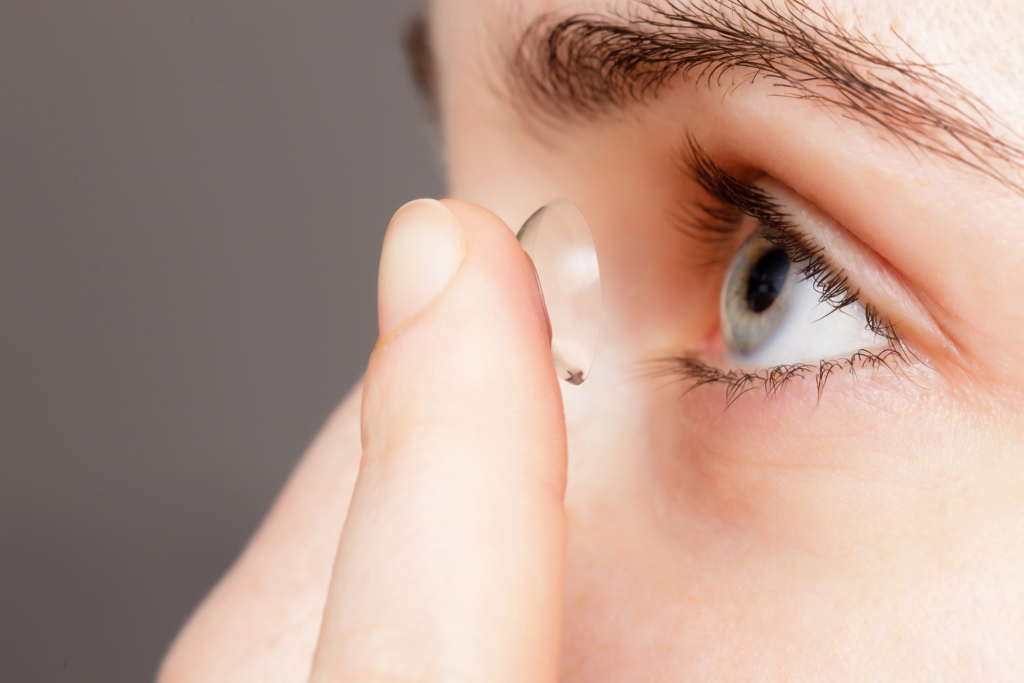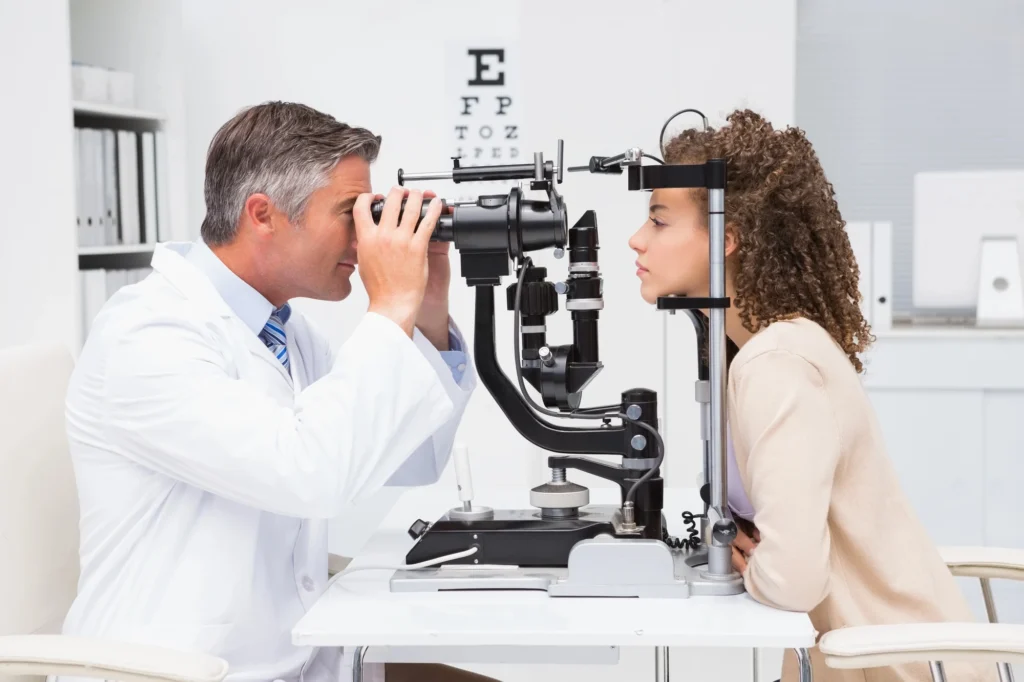When you’re on the go, it’s easy to overlook the importance of eye care, but your eyes need attention—especially when traveling. Whether you’re taking a road trip or catching a flight, environmental changes and long journeys can affect your vision and overall eye health. From air travel with contact lenses to protecting your eyes from UV rays in new climates, keeping your eyes healthy should be a priority.
At Eye Pros, we understand that travel can put extra strain on your eyes. That’s why we’ve compiled essential travel eye care tips to help you maintain clear, comfortable vision no matter where your journey takes you. Whether you’re concerned about flying after eye surgery or simply need advice on packing a contact lens travel kit, we’ve got you covered.
Common Eye Issues Travelers Face
Traveling can present several challenges for your eyes, from dry air on airplanes to increased exposure to UV rays in outdoor environments. Here are some of the most common eye issues travelers encounter and how to address them.
Dry Eyes
Long flights and extended travel can lead to dry eyes, especially due to the low humidity in airplane cabins. The dry air reduces tear production, causing discomfort and irritation. Whether you’re traveling with disposable contact lenses or wearing glasses, it’s important to stay hydrated and use lubricating eye drops to keep your eyes moisturized during flights.
Exposure to UV Rays
Traveling often means spending more time outdoors, which increases your exposure to harmful UV rays. Whether you’re hiking in a sunny location or skiing at high altitudes, UV protection is essential to prevent damage to your eyes. Be sure to pack sunglasses with 100% UV protection to safeguard your eyes from prolonged sun exposure.
Eye Infections
When traveling, you’re exposed to different environments, some of which may contain dust, pollen, or bacteria that can lead to eye infections. Poor hygiene, especially with contact lenses, can increase the risk of infections. Travelers should prioritize contact lens hygiene by packing a contact lens travel kit and ensuring they have access to clean water and hand sanitizer before handling their lenses.
Essential Eye Care Tips for Travel
Travel can be tough on your eyes, but with a few simple steps, you can keep them comfortable and healthy on the go. Here are some practical travel eye care tips to ensure your vision stays clear, whether you’re flying or spending time outdoors.
Stay Hydrated
Dehydration during travel, especially on long flights, can lead to dry eyes. Drink plenty of water to stay hydrated and keep your tear production normal. If you suffer from dryness, use lubricating eye drops to prevent irritation. Be sure to pack travel-sized drops in your carry-on.
Use Sunglasses with UV Protection
Whether you’re heading to a sunny beach or a snowy mountain, UV rays can damage your eyes. Always wear sunglasses that block 100% of UVA and UVB rays to protect your vision during outdoor adventures. This is particularly important if you’ve had recent eye surgery, as flying after eye surgery requires extra precautions for eye protection.
Pack Extra Contact Lens and Solution
If you’re a contact lens wearer, make sure to pack a contact lens travel kit with extra lenses, solution, and a travel contact lenses case. Consider traveling with disposable contact lenses, which are convenient and reduce the risk of infection. For longer flights, you may want to switch to glasses or ask your eye doctor whether it’s safe to wear your contacts in flight.
Take Breaks from Digital Screens
Long travel days often involve extended time on digital devices, which can strain your eyes. To reduce eye strain, follow the 20-20-20 rule: every 20 minutes, look at something 20 feet away for 20 seconds. This will help reduce the risk of digital eye strain and keep your eyes feeling fresh.
Eye Care for Different Climates
Different climates can affect your eyes in various ways, making it important to adapt your eye care routine based on your travel destination. Whether you’re heading to a dry desert or a humid beach, here’s how to protect your eyes in diverse environments:
Dry, Cold Climates
Cold climates with dry air can exacerbate dry eyes, particularly in places with low humidity. In these environments, use a humidifier in your hotel room to add moisture to the air and prevent eye irritation. Keep lubricating eye drops handy to hydrate your eyes throughout the day, especially if you wear contact lenses. If you plan to engage in outdoor activities, wearing sunglasses will also help protect your eyes from wind and cold air, which can cause further dryness.
Hot, Humid Climates
In hot and humid climates, your eyes may be more exposed to UV rays and irritants like dust or sand. Wearing sunglasses with UV protection is essential, as is keeping your eyes clean and free from debris. If you’re traveling to a beach or dusty area, consider wearing wraparound sunglasses for added protection against particles. For contact lens wearers, traveling with disposable contact lenses can be a good option to minimize the risk of infection in humid conditions.
Dusty or Polluted Areas
In areas with high pollution or dust, your eyes are more vulnerable to irritation and infection. If you’re visiting such a destination, use protective eyewear like wraparound sunglasses to shield your eyes from irritants. Keep a travel contact lenses case and a backup pair of glasses on hand to reduce the risk of infections from contact lenses. In these environments, good hygiene is key—always wash your hands before handling lenses, and avoid touching your eyes unnecessarily.
Traveling with Contact Lens
Traveling with contact lenses requires extra care to avoid discomfort and potential eye infections. Whether you’re flying or exploring new destinations, following these tips will ensure your eyes stay healthy while you’re on the go.
Pack Smart
Always pack a contact lens travel kit with essentials like a travel contact lenses case, solution, and extra contact lenses. Having a backup pair of glasses is also important in case your lenses become uncomfortable or damaged during your trip. If you’re planning to be away for a longer period, consider bringing more lenses than you think you’ll need.
Use Disposable Contact Lens
When traveling, disposable contact lenses are a convenient and hygienic option. They reduce the need for cleaning solutions and minimize the risk of infections, especially in environments where clean water isn’t readily available. Traveling with disposable contact lenses allows you to simply discard them at the end of the day, ensuring you always have fresh, clean lenses to use.
Can You Fly with Contact Lens
Yes, you can wear contact lenses while flying, but it’s important to stay hydrated and use eye drops to prevent dryness caused by the cabin’s low humidity. However, for long flights, it may be more comfortable to wear glasses to avoid the discomfort of dry eyes. If you’ve had eye surgery recently, such as LASIK, consult your eye doctor before flying to ensure your eyes are ready for the trip.
Maintain Proper Hygiene
Maintaining good hygiene is crucial while traveling with contact lenses. Always wash your hands with soap and water before handling your lenses, especially if you’re in a new environment where you might be exposed to dust or bacteria. Never rinse your lenses with tap water, as it may contain impurities that could lead to infections.
How to Prevent Eye Strain While Traveling
Whether you’re on a long flight or road trip, prolonged screen use can cause significant eye strain. Here are a few ways to protect your eyes and maintain comfort during your travels:
Take Regular Breaks from Screens
Looking at screens for extended periods, whether it’s a tablet, phone, or in-flight entertainment, can lead to eye fatigue. Follow the 20-20-20 rule: every 20 minutes, look at something 20 feet away for at least 20 seconds. This simple habit helps reduce eye strain and refreshes your eyes.
Adjust Screen Brightness
If you’re using digital devices while traveling, adjust the brightness and contrast to match the surrounding light. This reduces the strain on your eyes, especially in low-light environments like airplane cabins. You can also increase the text size to make reading more comfortable and avoid squinting.
Stay Hydrated
Dehydration contributes to dry eyes, particularly on flights where cabin humidity is low. Drink plenty of water throughout your journey to keep your body and your eyes hydrated. Keeping your eyes moisturized with lubricating drops can also help prevent strain, especially if you’re wearing contact lenses during travel.
Wear Blue Light Glasses
If you’re spending a lot of time on screens, consider wearing blue light blocking glasses. These can help reduce the amount of blue light entering your eyes, which is a known contributor to digital eye strain. It’s a simple way to make screen time more comfortable during long trips.
See an Eye Doctor Before Traveling
Before you head off on a trip, it’s a good idea to check in with an eye doctor—especially if you have existing eye conditions or are a frequent contact lens wearer. Here are a few instances where you should consider scheduling an eye exam before traveling:
Recent Eye Surgery
If you’ve recently had eye surgery, such as LASIK, it’s important to consult your eye doctor to ensure you’re cleared for travel. Flying after eye surgery can increase the risk of discomfort, and you may need specific care instructions to avoid complications during your trip.
Pre-Existing Eye Conditions
For those with conditions like glaucoma, cataracts, or macular degeneration, an eye exam before traveling is essential. Your eye doctor can ensure your condition is stable and provide any necessary medications or advice to manage your eye health while away.
Contact Lens Wearers
If you regularly wear contact lenses, it’s a good idea to get your eyes checked before traveling. Your eye doctor can ensure your lenses fit properly, and they can recommend whether you should consider traveling with disposable contact lenses to reduce the risk of infection during your trip.
Dry Eyes or Irritation
If you frequently experience dry eyes or irritation, especially during travel, your eye doctor can suggest treatments or recommend eye drops to keep your eyes comfortable on the go. This is particularly important for long flights, where cabin air can worsen dryness.
FAQs About Travel Eye Care
How do you protect your eyes from dust during travel?
To protect your eyes from dust, wear wraparound sunglasses or protective eyewear in dusty environments. Keeping lubricating eye drops handy can help flush out any particles, and avoid rubbing your eyes if they feel irritated.
Can I bring contact lenses on a plane?
Yes, you can bring your contact lenses on a plane. Just ensure you have a travel contact lenses case and travel-sized solution that complies with TSA liquid regulations.
Is it better to travel with glasses or contacts?
It’s often more convenient to travel with glasses as they don’t require the same level of hygiene or maintenance as contact lenses, especially during long flights or in environments where clean water may be limited.
How to store contacts while traveling?
Store your contact lenses in a travel contact lenses case with a fresh solution each time. Make sure to carry extra solutions in case of delays, and keep the case in your carry-on for easy access.
Can you wear contact lenses on a plane?
Yes, you can wear contact lenses on a plane, but it’s important to stay hydrated and use lubricating eye drops to prevent dryness. For long flights, wearing glasses may be more comfortable.
What should I do if I get an eye infection while traveling?
If you suspect an eye infection, stop using contact lenses immediately and use lubricating eye drops. Seek medical attention from a local eye doctor as soon as possible for proper treatment.
Why do my eyes get dry on planes?
Airplane cabins have low humidity, which can dry out your eyes. Use lubricating eye drops, stay hydrated, and blink more frequently to keep your eyes moisturized during the flight.
Taking care of your eyes while traveling is essential for maintaining clear vision and comfort. From managing dry eyes during flights to protecting your eyes from UV rays and dust, these travel tips will help keep your eyes healthy on the go. Whether you wear contact lenses or glasses, proper eye care can make your trip more enjoyable and worry-free.
Before your next adventure, schedule a comprehensive eye exam with Eye Pros to ensure your eyes are in optimal health. Our expert team can provide personalized advice on protecting your eyes while traveling, offering solutions tailored to your vision needs. Book your appointment now!





